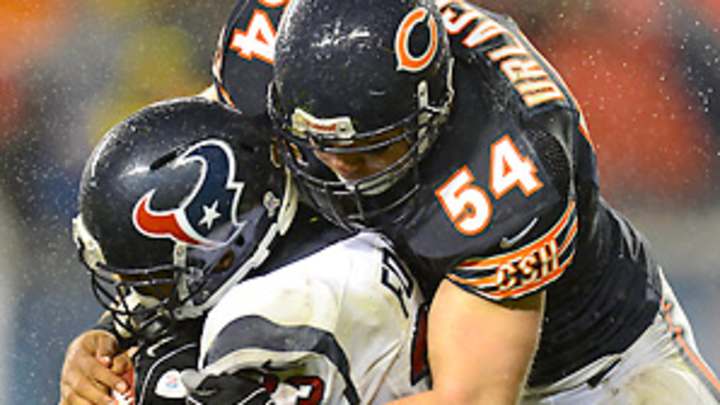Urlacher says again he'd lie about concussion


LAKE FOREST, Ill. (AP) Brian Urlacher wasn't backing down. Chicago's star linebacker would still lie to cover up a concussion.
Urlacher raised a few more eyebrows on Thursday when he reiterated what he told HBO earlier in the year, and it didn't seem to matter to him that Bears quarterback Jay Cutler is recovering from that same injury.
His stance remains the same.
"Yeah," he said when asked if he would lie to cover up a concussion.
Coach Lovie Smith wasn't quite sure how to respond to a question about Urlacher's comment.
"I don't think players will cover up an injury, so that's what I make of it," Smith said. "I didn't hear Brian say that, so I don't know exactly what you're talking about. I just know when Brian has been injured, when he hurt his knee he came out, and every other injury I assume he's had he's come out. That's what I'm going with."
Urlacher acknowledged it would be tough to cover up a concussion while questioning whether newer helmets really were cutting down on such injuries, and he added that the NFL needs to do a better job protecting players from knee injuries.
He said there are points in most games where a player is woozy from a hit, where "you're like, whoa, that was a good one."
But, he also said: "I don't know how you can lie these days with all the (stuff) they have to see who's concussed and who's not. I don't know how they can tell in the first place. I think the helmets aren't very good. I wear an old helmet and Lance (Briggs) wears an old helmet. We don't get concussed. We have some pretty good collisions, we don't get concussed. I think a lot of it has to do with the helmets. They're saying they're better but they must not be because people are getting more concussions now."
Urlacher said he suffered a concussion against Denver in 2003 but didn't miss any games that season.
"I've been lucky," he said.
Cutler wasn't so fortunate on Sunday. The Bears believe he suffered his concussion when Houston's Tim Dobbins nailed him with a helmet-to-helmet hit late in the first half that forced him to sit out the final two quarters of a loss to the Texans. His status for Monday's game against San Francisco is in question, and if he's not available, Jason Campbell figures to start in his place.
That could leave both teams without their starting quarterbacks, because the 49ers">49ers' Alex Smith is also recovering from a concussion he suffered last week.
Head injuries and the long-term effects are a hot-button issue in sports, particularly in the NFL. The league has cracked down on flagrant hits in recent years and toughened its guidelines for treating players with concussion symptoms. Cutler and Smith need to be cleared to return by their team physicians and independent neurological consultants.
The issue has been getting plenty of attention this week in Chicago, but Urlacher would like to see the league focus more on the knees. Specifically, he'd like to see cut blocks banned.
"But that seems to be OK with the NFL so they're not too concerned about safety, obviously," he said. "They are concerned about long-term concussions, but immediately they're not concerned about your knees or your ankles or anything like that. I think that should be an issue. Concussions are taking care of themselves. It's a big deal now to everyone because of all the older players coming back and saying they're all messed up now. That's definitely an issue, but I think the cut blocks need to be a big issue as well."
Isn't there a big difference between a head injury and knee injury?
"Huge," Urlacher said. "Because a knee injury puts you out for a season, a concussion you may miss a game or two. Huge difference."
Then, he acknowledged the long-term impact of head injuries.
"That's why you have to judge," Urlacher said. "If you don't want to play if you get concussed, then don't play. It's your career. It's your life."
On the knee issue, defensive end Israel Idonije agreed "100 percent."
"We all know that, though," he said. "It's an offensive game. Ultimately, a lot of the rules that are put in are put in place to advance the offense. And defensively, we're second fiddle at times. That's just the nature of the game. So hopefully the bodies that govern the rules and protections do a better job of taking the injuries that the players on defense consistently sustain, they take those seriously and remove some of those elements from the game as well."
But when it comes to concussions?
Defensive end Corey Wootton was just as adamant as Urlacher. Would he lie?
"No, I wouldn't," Wootton said.
He said he's discussed the issue with former teammate Hunter Hillenmeyer, whose career was cut short by concussions. He also mentioned Dave Duerson, one of the stars on the 1985 championship team who suffered from the degenerative brain disease chronic traumatic encephalopathy and died of a self-inflicted gunshot wound.
"This is not what we're going to be doing for the rest of our lives," Wootton said. "A lot of people have families and want to have families eventually, want to play with their kids and live a long life."
